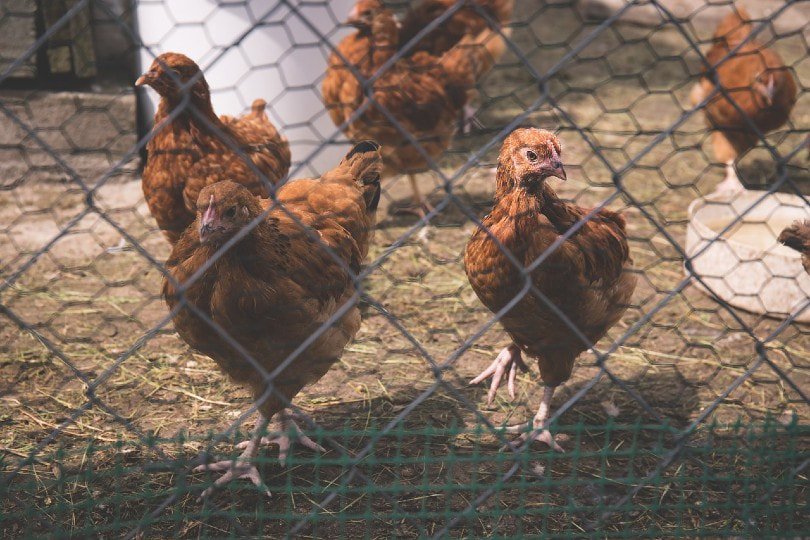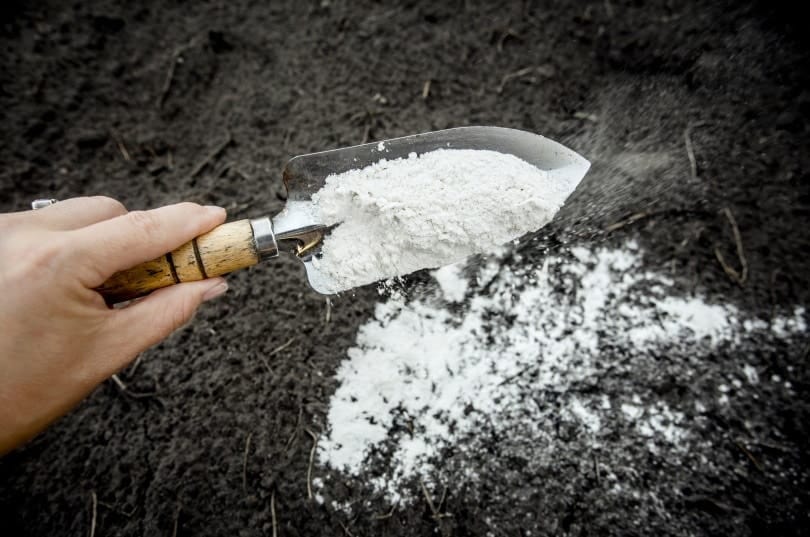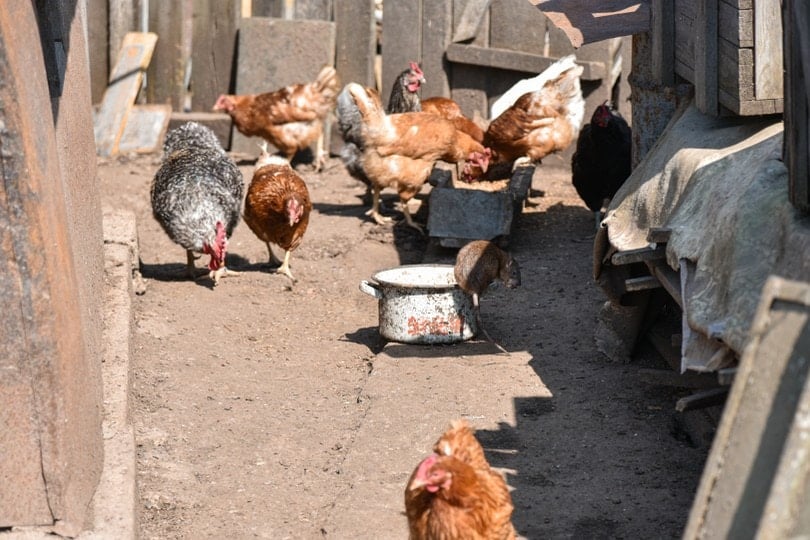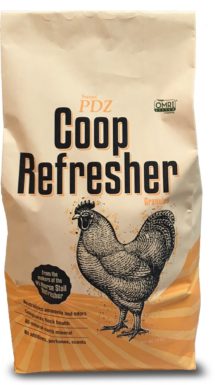Approved by Dr. Luqman Javed
Any flock owner is familiar with unpleasant odors that come from their chicken coop. Even though you love your feathery friends, combating the smells they produce can be pretty tricky. Luckily, we have a few solutions for you.
You might have already thought about a couple of the solutions regarding the aroma coming from your backyard chickens, but utilizing one or several of the options below can make all the difference. Let’s get into it!

The 8 Ways to Get Rid of Chicken Coop Smell
1. Promote Air Circulation
The air inside coops can become stagnant. When you have a bunch of birds pooping in the same area, it can get stinky quickly. Did you know that chickens can eliminate up to 15 times a day? And that’s just one chicken!
Typically, people have flocks of at least four chickens, and sometimes people have many more than that. So, if you have all of these chickens together in one space, things will likely get messy and smelly.
If there is no air circulation in your coop, it will cause all those smells to linger. Getting a fan or another type of device to generate circulation will help reduce the odors that you (and your chickens) experience. For the best results, it’s advised to use two fans: one fan that blows in fresh air from outside, and another fan which acts as an exhaust fan to remove stagnant air from within the coop itself.
Another idea is to leave a coop window or door open, allowing the fresh air to mix with the coop air. Plus, in the warmer months, your chickens will appreciate the coolness of a well-ventilated living space. Just make sure you are living in an area where the risk of predators coming for your chickens isn’t high, otherwise, a fox or wolf may have easy access to your coop if you choose to leave the door or window open.
In winter months, however, if you have a fan running, it’s best to make sure your chickens get adequate heat. You wouldn’t want to freeze them out in an effort to have the coop smell better.
Many chicken keepers install a wall-mounted box fan in the coop. This is both inexpensive and relatively easy to set up. You can find box fans for as little as $15. Depending on the size of your coop, it may help to have more than one.

2. Use Aromatic Plants
Just about every person in this age is pretty familiar with the power of essential oils and herbs. These are highly concentrated natural plants that have aromatherapy effects.
The original plants from these oils and herbs can be highly effective at toning down the smells in your coop. It might even make the coop smell good! You can plant these items around the pen for strong odor control.
- Lavender
- Thyme
- Rosemary
- Sunflowers
- Mulberry trees
- White clover
Please note that some of these plants can be problematic if consumed in large amounts by your chickens. Also be mindful that your chickens will likely readily consume these plants if given the chance. This is something that you need to be mindful of if you intend to keep the plants for more than just odor control purposes. In addition, though these plants aren’t toxic for chickens, they may be toxic to other pets or farm animals. For example, lavender is toxic for cats. If you have multiple pets, ensure that any plants you use for odor control are safe for all your pets and well out of their reach.
Also, if you’re planting, beware of toxic plants for chickens that could be risky, including:
- Nightshade family plants
- Mountain laurel
- Wisteria
- Yarrow
- Castor bean
- Jasmine
- Iris
- Ivy
You can also sprinkle petals from roses and other lovely-smelling flowers to control the odor (however, your chickens might just eat them as a snack).
3. Try Lime
Lime? Just lime? Well, maybe not the lime that first comes to your mind. We’re not talking about the delicious green citrus fruit. We are actually talking about ground-down limestone, also known as calcium carbonate. If you haven’t heard this before from any of your fellow chicken keepers, a lime is a godsend for many.
Of course, you want to ensure that you get agricultural lime to ensure that it’s entirely safe for your barnyard buddies. Certain limestone products are not suitable for livestock, so you need to do your homework.
Many feed stores and online websites have agricultural lime for sale. Not only is the substance safe for chickens, but you can utilize it for other barnyard animals as well. It is a natural bug repellent, too, so you can kill two birds with one stone (just not your chickens).

4. Clean Frequently
If you have ever had a caged animal in your home like a hamster or guinea pig, you are well aware of the importance of spot cleaning cages. Removing dirty spots daily will increase the longevity of the bedding you choose and reduce smells.
Chicken coops work precisely the same way but on a larger scale. Flocks benefit greatly from routine quick cleans once a week at least. That means setting a schedule to go out and scoop the dirty parts of the coop, removing feces from apparent areas.
You don’t have to remove all the bedding at once if you keep up with it. You can also replenish the bedding supply, refreshing it when necessary.
Also, the coop needs an intense cleaning at least twice a year. It would help if you made sure to remove any bedding, debris, buried eggs, and other such things to revitalize the area thoroughly.
5. Reduce Moisture
Moisture is not your friend when it comes to keeping chickens. You can turn the entire floor of your coop into a stinky soup in no time if you don’t control it. The coop needs, in addition to being well ventilated, to have no excess moisture where the bacteria from the feces can fester.
If you have ever kept ducks, you know that there is absolutely no way to clean their area. Every time you give them fresh water, it’s dirty within minutes, and they’ve slung it into their bedding and everywhere else.
Luckily chickens are a little bit better about keeping the water where it belongs. Even though they are not quite as messy as their waterfowl cousins, they can knock over water sources and spill things if given the opportunity.
Even though when night falls, most chickens are ready to hit the hay, some of them might still get up to take a drink or frantically buzz around the coop, knocking over water bowls or bottles. Many keepers like to remove any water dishes when the night ends to eliminate the risk because when the water mixes with the liquid bombs your chickens leave, it can turn the bedding sour quickly.
Also, if you have any open windows in the coop, it is a good idea to shut them or put up something to protect the coop’s interior from rainwater. So, if you are expecting inclement weather, you can secure the cage so no moisture gets inside.

6. Try Commercial Products

There is a market for everything you can even think of these days. You know by smelling that coop that you’re not the only person who has a massive problem with it. Many companies have caught on and are catering to their consumers’ needs with a host of cleaning products for flock owners.
If you’re looking for a quick fix for your coop’s odor problems, we like Sweet PDZ Chicken Coop Refresher, for example.
This product uses a unique combination of minerals as odor neutralizers to reduce the smell of ammonia in the coop. It is in pellet form, easy to spread on virtually any type of bedding—from sawdust to straw.
Plus, it’s entirely chicken-safe!
You can use the product one to three times per week with no issues. It is an excellent multipurpose item on hand, a real lifesaver for many chicken keepers.
If you have solid soil in your pen, you can also try a product like Coop Control to reduce smell, provide aeration for the soil, and even ward off flies—which can really stress hens out.
7. Coop Rotation
If your chicken coop is portable or easily moveable, it helps to relocate it elsewhere on a monthly or quarterly basis to clean and freshen up the area it was previously in. Doing so greatly reduces the odor associated with chicken coops and also provides your chickens with a change of scenery! Please note that many pets may try to eat chicken poop if you relocate the coop, and you shouldn’t let them do so. Dogs are known to try and eaten chicken poop (for various reasons), which can be problematic for their health.
8. Coop Location
Odor control is better achieved when chicken coops are placed in downwind. Doing so carries odors from the coop away from the environment and your house rather than towards your house.

Conclusion
Utilizing these tips, you can keep your chicken coop smelling less like a cesspool. But we want to stress the importance of cleanliness to prevent illness among your flock. That’s really the most critical aspect of keeping your coop tidy.
You can use one or a combination of these methods, and you are likely to see favorable results. Sure, some of them might take a few extra minutes out of your routine, but the results are well worth it.
See Also:
- How to Get Rid of Pig Odor: 7 Ideas & Tips (with Pictures)
- 10 Best Books on Raising Chickens: Reviews & Top Picks!
Featured Image Credit: richardernestyap, Shutterstock |
